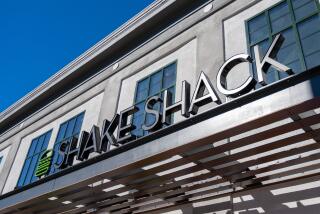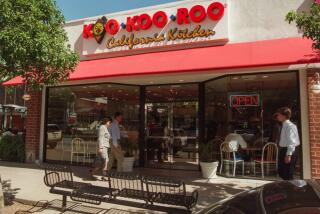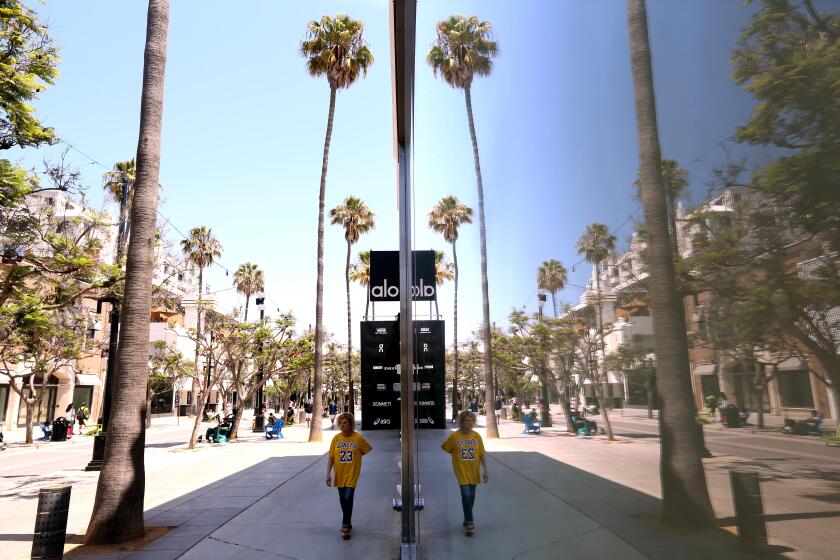L.A.’s iconic Fatburger restaurant chain prepares to take its story to Wall Street

The upcoming initial public offering of stock in Fatburger’s parent company won’t be big by Wall Street standards.
But it will draw attention because of the burger chain’s near-cult status in Los Angeles. Besides its celebrity franchise owners, which include Kanye West and Pharrell, and such fans as Nicki Minaj and Justin Bieber, the company has a rich history.
African American entrepreneur Lovie Yancey started her first restaurant — calling it Mr. Fatburger — in a shack in Exposition Park in South Los Angeles 70 years ago, catering to many area entertainers such as Ray Charles.
Over the years, the brand has been immortalized in rap songs like Ice Cube’s “It Was a Good Day,” in prime-time sitcoms and in blockbuster movies, including “The Fast and the Furious.” David Letterman named Fatburger as one of the top 10 things he’d miss most when his “Late Show” left Los Angeles.
Today privately run FAT Brands Inc. is enjoying its best financial performance in years. Revenue passed $10 million in 2016 and is climbing 12% so far this year, it says.
Chief Executive Andy Wiederhorn envisions using the stock-offering proceeds to expand from the current nearly 300 restaurants to 500 in the U.S. and overseas.

FAT Brands Inc. is going public.
“We created FAT Brands to be a global franchising company,” Wiederhorn said. “We felt like the public market was the perfect way to continue to access capital to buy more brands to distribute to our franchise partners.”
Fat Brands hopes to raise $24 million at $12 a share when it opens trading on the NASDAQ later this month. The company is talking up potential investors but is unable to sell to any of them until the Securities and Exchange Commission clears the stock offering.
But investors may be wary of betting on restaurants. The U.S. is so saturated with burger offerings in particular — from big fast-food chains to gourmet boutique restaurants — that experts expect only slow growth and small profits through at least 2022.
There are more options for meal dollars than ever before. Ready-made ingredients can be shipped to homes and cooked. Supermarkets are emphasizing buffet-style meals.
“It’s a very challenging time for an IPO,” said Bonnie Riggs, a restaurant industry analyst with the NPD Group. “We have had six quarters in a row where we have had flat to negative performance for restaurants, and that’s across the board. Fast food had been carrying the load, up just 1%, but now it’s flat, too. Fast-casual dining has also slowed.
“We keep building new places to eat and we don’t have the people to fill them.”
Fatburger already has faced its share of challenges.
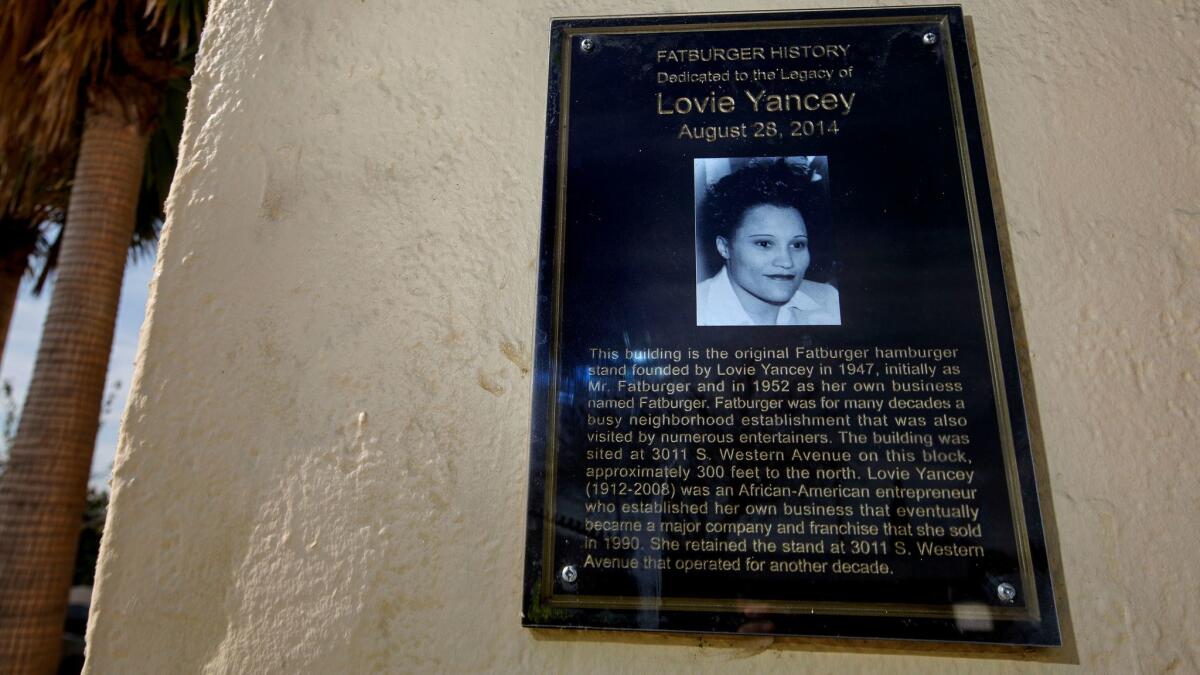
Yancey sold her interest in Fatburger to a British record producer for $3 million in 1990, when she was 78. (Yancey died in 2008.) In 2003, when the chain had just 40 outlets, a group led by Magic Johnson sold it to Fog Cutter Capital Group, run by Wiederhorn, for $7 million.
Saddled with expensive leases and unprofitable locations, subsidiaries in California and Nevada filed for bankruptcy reorganization in 2009. Several restaurants were closed.
Then there’s Wiederhorn’s own colorful past. He was a local golden boy, finishing USC in three years with a degree in business and founding the investment firm Wilshire Credit Corp. at age 21. Billionaire Eli Broad was one of his first — and biggest — backers, with an investment of $300 million.
Wiederhorn founded Fog Cutter Capital in Portland, Ore., in 1997, and bought that controlling stake in Fatburger in 2003. But that same year one of his business associates was arrested under a 22-count federal indictment, including charges of mail fraud, money laundering and witness tampering.
In 2004 Wiederhorn pleaded guilty to charges of paying an illegal gratuity to that associate, and to filing a false tax return. He paid a $2-million fine and served 15 months in prison in Oregon.
Wiederhorn has always been candid about his days in the slammer.
“I’ve always adamantly denied doing anything wrong intentionally,” Wiederhorn said in a recent interview. “I’m very grateful for it. I felt like I paid the fine. I did the time. I did everything I was supposed to do to make this go away and put it behind me.”
Experts in business ethics say investors might be unfazed by Wiederhorn’s past.
“This used to be a deal-breaker most of the time,” said Gonzalo Freixes, an associate dean at UCLA who teaches taxes, business law and ethics. “I think there is a growing trend in society, both legally and culturally, to be more forgiving about past convictions.”
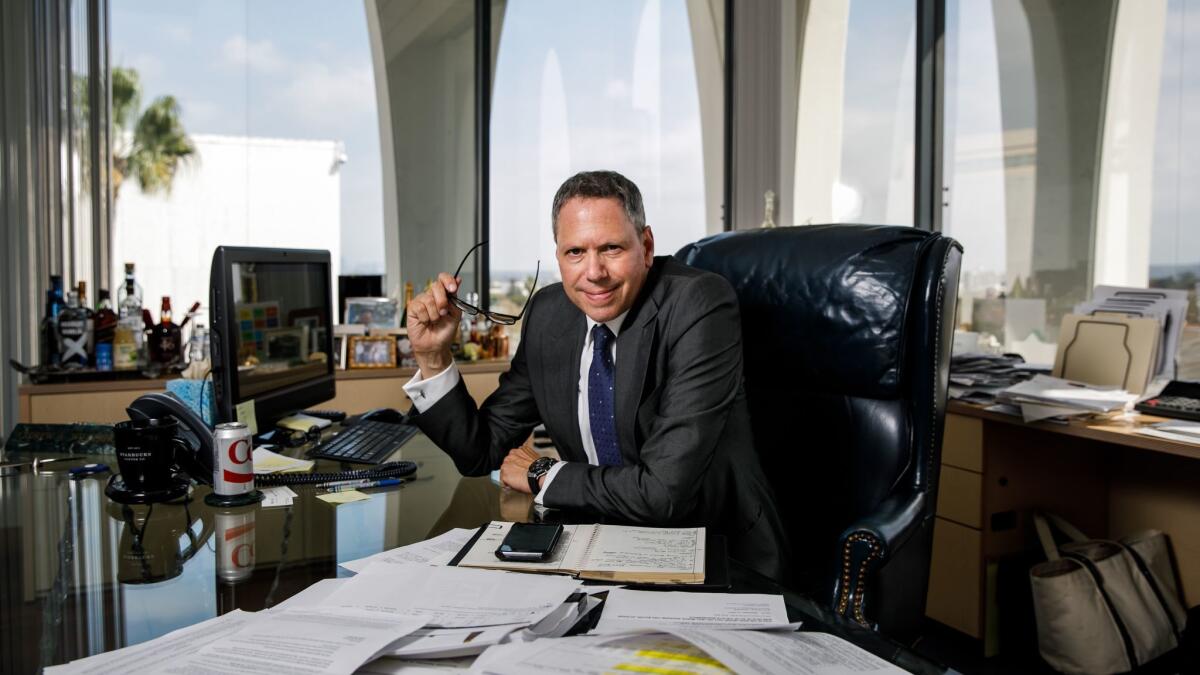
Investors may be more interested in how Wiederhorn is guiding Fatburger’s growth.
Coming out of the 2009 bankruptcies, Wiederhorn went to an “asset-light” model. Today, all of the 70 Fatburgers in the U.S. are franchises. Most are in California.
“Our true customer, as a franchise company, is the franchisee,” Wiederhorn said. “What we care about is that our franchisees are profitable, have the right margins, are growing their business, so that we earn more royalties and they’ll build more stores. That’s our focus.”
Most of the expansion in recent years has been overseas, including Asia and the Middle East. Fatburger will open its first Japanese units next year.
Wiederhorn says the foreign focus kept the chain afloat during the Great Recession.
“Those franchise fees and royalties internationally saved our company because those parts of the world were not suffering as much during the recession,” he said.
The company has acquired several mature but somewhat stagnant brands, beginning with Buffalo’s Cafes in 2011 and more recently Ponderosa and Bonanza Steakhouse. Now there are 70 Fatburgers that also serve chicken and sauces from the Buffalo Express menu.
Wiederhorn said he hopes investors will be impressed with the stability of Fatburger franchise owners, some of whom go back decades.
One of them is Robert Schuster, who has owned Fatburgers for 20 years. He opened his first in Brentwood and now owns five stores, including three in Las Vegas.
Schuster hasn’t given much thought to the upcoming IPO, but hopes it may generate some more business.
“It will produce better name recognition. It’s like you can’t get your name in the news too many times, right?” said Schuster. “So, if Fatburger is in their head, maybe they’ll stop in to one of mine and buy one of my burgers.”
For more business news, follow Ronald D. White on Twitter: @RonWLATimes
More to Read
Inside the business of entertainment
The Wide Shot brings you news, analysis and insights on everything from streaming wars to production — and what it all means for the future.
You may occasionally receive promotional content from the Los Angeles Times.

